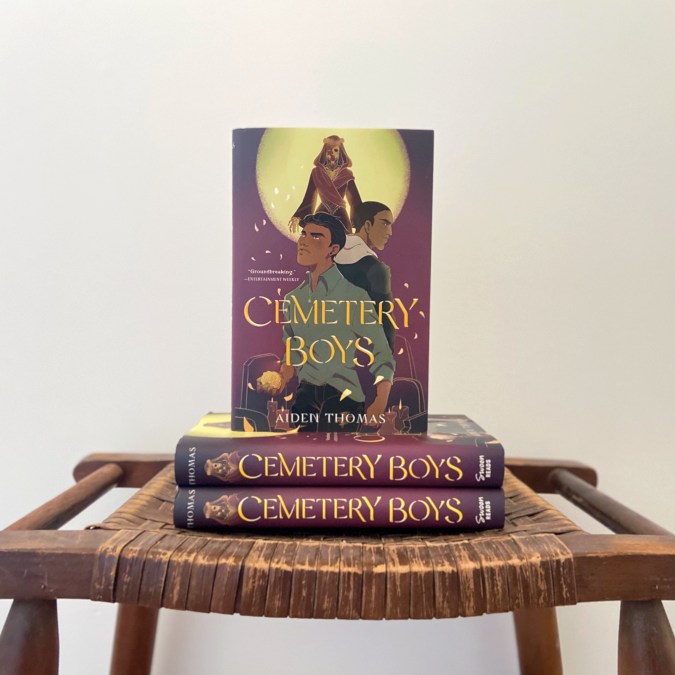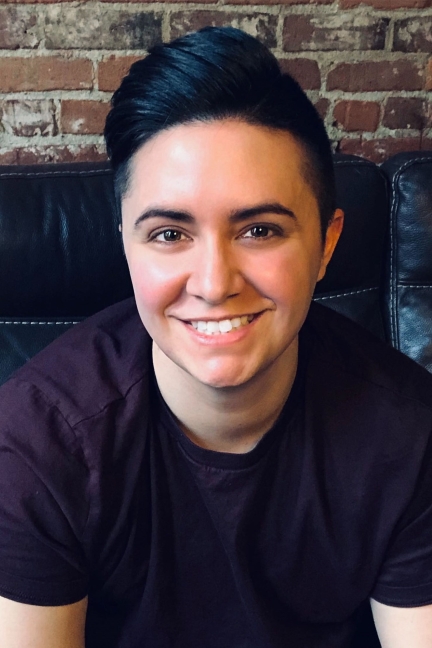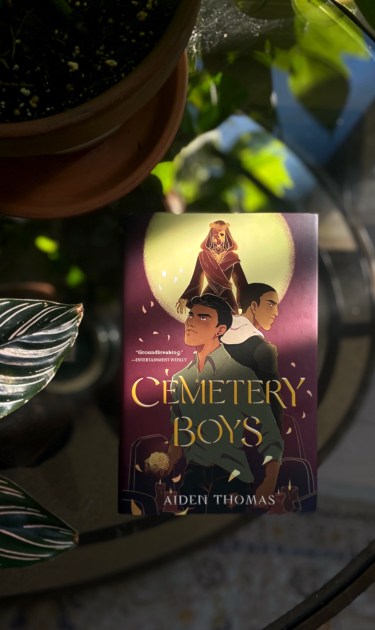Aiden Thomas’ new novel Cemetery Boys explores themes like brujeria, Día de los Muertos, and other parts of his Latinx heritage and experience while highlighting a queer, trans boy in the process. Debuting at Number 8 on the New York Times Best Seller list for Young Adult Hardcover list, the novel marks a first in LGBTQ+ history.
Cemetery Boys, which came out on Sept. 1, tells the story of Yadriel, who is confident in himself and his own identity as a gay, trans boy of Cuban and Mexican descent. Throughout the story, he and his best friend and cousin Maritza try to prove he’s a real brujo by performing the quinces ritual on his own. Things go south when they summon Julian—the “school’s resident bad boy” who does not want to go into the afterlife without solving his own mystery.
The original idea for Cemetery Boys came from a Tumblr post that “exploded” for Thomas, who also happens to be queer, trans, and Latinx. During a Zoom interview with Remezcla, we joked about how Cemetery Boys was like a “gay version of Casper.”
Cemetery Boys is like a ‘gay version of Casper.
“It’s funny because in that Tumblr post there were re-blogs and replies with ideas and stuff that were like ‘Oh, here’s a really scary and spooky idea.’ And I am over here at my laptop being like, ‘But what if he was cute, that’s what I’m interested in.’”
Yadriel and Julian have a lot to work through, both within Julian’s own story and their growing feelings, but Thomas took care to also really dig into the mysticism within Mesoamerican cultures. Cemetery Boys is such a joyous and intriguing mix of so many things, from Latinx culture to dealing with family life as a queer Latinx, on top of the ever-frustrating binary of the language and culture. And for queer, trans, Latinx teens, this story could be their getaway into a world that hasn’t yet been explored.
This interview was condensed and edited for clarity purposes.
What was it about Cemetery Boys that made it more of your debut novel?
So, the first book that I sold is called Lost in the Never Woods [coming out in 2021]. And it’s a dark reimagining of the Peter Pan canon. It’s funny because [with] Cemetery Boys, when I pitched it, it was the last of my list of like five ideas that I sent her in an email. And it was a paragraph long and most of the sentences ended in question marks.
I’m just fascinated at this idea, because I thought, for sure, that having a book with a Latinx character, and a Latinx magic system, let alone a character who is gay and trans, was something that [wouldn’t] be marketable at all. I had so internalized… that stories about people like me, aren’t gonna get sold. No one wants them. So that was a huge turning point for me… I think this book is—even though I had no idea when I was writing it—it’s something that’s different and hasn’t had the opportunity to be told… So at that point, it was like, wow. Yeah. This would be really important, to have this as my debut novel to really come into the publishing world and be like, ‘This is my book and this is me.’
Do you think that your identities being so intrinsically tied to Cemetery Boys made it subconsciously deeper or more important? Or it just developed in a different way?
Definitely a lot more important. Not to say that my other book isn’t important, because it is about other aspects of me and my experiences. But it just meant the world honestly. Like I said, it felt like something that I wasn’t allowed to write. That no one was interested in, that there wasn’t room for. And then to all of a sudden, to have this community within the publishing and writing realm be so excited and so encouraging and supportive, it was incredible. The book means so much to me at this point because it’s much more than just a book. And I think it’s more than just a book to me and to readers who identify with a lot of aspects of Yadriel’s experience… It’s turned into a thing that I never thought would happen.

In an interview with Den of Geek you said you wanted to have a character that you hadn’t seen before that. Can you touch on Yadriel and what you relate to most about his character?
Yah, so Yads is queer. He’s gay… He’s Latinx; he is Cuban and Mexican. And he’s a trans boy… I kind of pulled from my own experiences and kind of gave it to him. Especially when it comes to being a trans, Latinx person, specifically because things get complicated. Especially when your native language is gendered, then automatically you’re set up with a lot of obstacles or landmines, as what I call them. Kind of instances of being deadnamed or misgendered. That just kind of pops up out of nowhere, like you’re stepping on a landmine. Then all of a sudden you’re hit with all these really bad feelings.
So that was a big one. And then he’s, what I think I like most about him and what I feel like is kind of my general experience, is that he means really well and he’s always trying to do the right thing, but it just blows up in his face constantly. So that’s definitely like one of those experiences for me. And he’s not necessarily someone who’s going to come out of the gates swinging and ready to fight. He’s gonna have a lot of insecurities and feeling anxious and like he can’t do it or that he even shouldn’t do it sometimes. And for me, and kind of going through my own journey, like figuring out my gender and all that stuff, that’s definitely something that I felt myself. And I think that that’s a pretty valid experience for a lot of trans and non-binary folks.
Like in the kitchen with his family, dealing with all the misgendering and stuff like that.
Yeah. Because it’s, like, levels of coming out. Right? That he’s doing, and will be doing, his whole life. The first one, and what’s already established, like you said, when Cemetery Boys already starts, he knows exactly who he is. He’s not figuring out his gender. He’s not figuring out his sexuality. He knows that he is a gay, trans man. But it’s all of the stuff that comes after that, that comes after the coming out. Like having to deal with family and friend dynamics and kind of all the obstacles that come with it. That’s really what the story is about.
Going into the other characters, I know that you’ve been playing with the character of Julian for a while. So what was so fascinating about him that you liked bringing to life in this novel?
I just love Julian because of his chaoticness and kind of how all over the place he is. And I felt that that’d be a good counterpart to Yads’ cautious moving through the world, to then be thrown into this mess of a mystery with this boy who is absolutely just bouncing off the walls. So I think that their dynamic, in general, is really great.
But what’s so much fun about Julian is… he’s another character that’s very sure of himself and knows who he is, but he is ready to come out swinging. He has no fear whatsoever. And I think that was important for Yads to see in someone else, that he could relate to this kind of someone who isn’t as cautious or isn’t as afraid of sharing themselves or getting to know other people. [Julian’s chaos is] really fun to write, because you’re just like, ‘OK, what would a teenage boy who has, like, no sense of caution do in this situation? What would be the strict impulse move here?’ And that’s such a blast to write and play with.
I didn’t want it to be this story about how terrible his family is. I wanted it to be more that there’s a learning curve.
Martiza is described as another black sheep because she’s vegan, which I thought was a great detail going into another aspect of a Latinx household. Not necessarily the gendered language, but the culture. [Most of us] eat meat with everything. So what did you enjoy writing about her?
What I love most about Maritza is that she is like the wish-fulfillment best friend character. She is unwavering in her support of Yads and she’s so strong and she will literally do anything for the people that she cares about. And that unwavering, kind of stable support system is something that I wish that I had growing up as a closeted trans youth. Being able to write Martiza, it was like, if you’re an ally, this is the good kind of shit that you should be doing. Every trans kid is wishing that they had someone like Martiza. I know that I did. And having a Martiza in my life would have changed everything for me. It would have been a much different and much less painful process.
So, writing her, for trans kids who are reading the book, it’s to be like, ‘Oh, my gosh. Yes, that is the best friend that I want.’ And then for allies who are reading the book, it’s like: This is how you can be a good ally. So she’s so important, she’s so great. I love her so much. She was a really important character for me to write.
We definitely stan. And speaking of the traditional Latinx family, they, unfortunately, don’t accept Yadriel’s identity. What was important for you to cover, in writing Yadriel’s home life and family?
So I feel like whenever we have a story… about a trans character, the family is one of two like binary—you know, talking about binaries all the time—it’s one of two very polarizing ways. They’re either 100% accepting and everything is great and they’re really good allies. Or the other side is that they reject their child and then that’s it. They’re done with them.
I think realistically, especially with [the] culture that I have experienced with myself and my friends, is that it’s not either of those extremes. It’s somewhere in the middle. It’s not that they don’t love you anymore. They absolutely still love you. It’s understanding the queerness that’s complicated. Because, for most of them, that’s not something that they’ve ever come up against, it’s not something they’ve ever been introduced to. They’re convinced that they’ve never met someone who’s queer. Even though that’s absolutely not true. So I didn’t want it to be this story about how terrible his family is. I wanted it to be more that there’s a learning curve. And unfortunately, a lot of the weight and pressure and responsibility of teaching falls on to that queer kid in that family.
For me, that was really important. It wasn’t that his family doesn’t love him. It was just that they were confused. And that confusion and misunderstanding can lead to, you know, the landmines like the misgendering and the deadnaming. And it can also lead to things like people kind of stepping back and trying to avoid the person. Not because they’re like, ‘Oh, I don’t want to do all that,’ but because they’re afraid to mess up. That’s, I think, a really valid experience for folks who aren’t familiar with what queerness is. And they get anxious and they’re like, OK, well, instead of messing up, I’m just going to avoid it altogether. Which isn’t great.

In Spanish, touching on binary, the language is gendered. So, you have the brujo vs bruja world. Not that brujeria or brujx isn’t a real thing to some, but how did you tackle this very mystical binary world with the real Latinx binary world?
Yeah. So it was kind of multiple things going on there at once. Because in general, a lot of magic systems and fantasy are kind of binary for whatever reason. They’re like, women can do this and men can do that. And so I wanted to play with that. And I also like to play with how Latinx folks view binaries. So the magic system, it was important for me that it was gender-affirming…
And that, for me, was a plot point to help the brujx in Yads’ community see him for who he was… For Cemetery Boys, the overarching person who [brings people from the outskirts of the community in] is Lady Death, the literal figurehead of their spiritualism. So that was really important.
I wish I could have played with it more because I wanted to talk about what agender and non-binary folks within the brujx community, how they function and stuff like that. But for Yads’ community, it was a step in the right direction, a large step in the right direction of kind of learning and seeing with their own eyes to be able to kind of understand it. But yet it’s so complicated and it’s so nuanced. But it was really fun to kind of play with and kind of push the boundaries.
You also mentioned that you had authenticity readers and that it was important for you to get representation right even though you’re still part of these identities. So what were some things that you learned about yourself along the way with that aspect of the novel?
So I was terrified—still am terrified—that I would write something that would end up hurting someone in my community and that was the absolute last thing that I ever want to have happen with this book. So… I asked my publisher to get sensitivity readers. And that was really helpful.
Luckily, there wasn’t anything glaringly terrible… but just having it from those different perspectives, there were really small things like microaggressions that kind of went through that I didn’t catch. And I think it’s really important, as a writer, that I don’t seek out authenticity readers as folks to like, give the OK of what I’m writing. I’m genuinely here to learn and do better.
This is the first-ever YA novel to have a queer, trans, Latinx person. I know that was anxiety-inducing for you because essentially you wanted this to be like escapism for marginalized readers. What are some things that you want people to take away from the novel when they’re done with it?
Honestly, I think the most important part is for readers, especially when we talk about just the marginalized readers—even though all readers are important—for marginalized folks, what was really important for me was that they felt seen and connected.
For me growing up, I didn’t knowingly, I guess, see or interact with queer folks, especially trans folks. So I didn’t see people until I was on the Internet, like on Tumblr. That was the first time I ever saw a trans boy. That was the first time I ever really saw pictures of, like, two boys being in love and kissing and stuff like that. And it’s interesting how you can feel so connected and so seen and represented by these people who you don’t even know, or like in books who don’t even really exist. But they can be so important to you and figuring yourself out more than like the people you physically have with you.
So that was kind of important to me, to be able to provide another one of those characters or people, figures, that marginalized folks could see. They can see that Yads is loved and he is supported and he is powerful. And to be able to be like, ‘Yeah, that’s me. I’m so happy for Yads and Yads is like this great character, and he’s doing so much and he is succeeding.’ And being able to internalize that for themselves and like to feel that connection. That is the most important part for me.
Ok, last question. So I haven’t gotten to the end yet, and I know we don’t want any real spoilers in here, but what do you see for the future for Julian and Yadriel and this book in general?
I have so many ideas. There was so much that I wanted to cram into Cemetery Boys, but I just did not have the time or space for, like it’s a long book. And like I mentioned earlier, talking about non-binary or agender brujx and kind of what that looks like. There’s definitely more stories in my head. So I don’t know. We’ll see… Hopefully, Cemetery Boys does well and then I’m given the opportunity to write more. That’d be fantastic. But I have so much in my head. I could, like, fill up an encyclopedia for Cemetery Boys, honestly.





